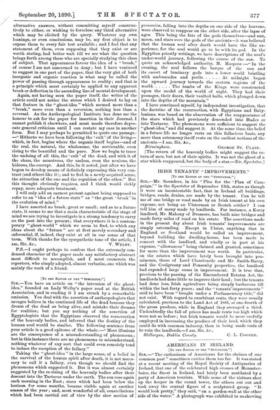IS THERE A BREAK IN MENTAL EVOLUTION F
[TO THE EDITOR OF THE "SPECTATOR."]
SIR,—With reference to the article in -the Spectator of September 13th on my paper (with the above title) read at Leeds, may I be allowed a few words with the object of averting needless misconception You say: "There is always one prodigious 'break,' as Lady Welby calls it,—namely, the intrusion of the ghost-idea." But I have purposely avoided dogmatising on this diffi- cult and little-worked subject, and have loyally kept. within the ground of asking a question and suggesting
alternative answers, without committing myself construc- tively to either, or wishing to foreclose any third alternative which may be elicited by the query. Whatever my own leanings, or even conclusions, may be, my first object is to expose them to every fair test available ; and I feel that any statement of them, even supposing that they exist or are worth stating, had better wait till we see what the question brings forth among those who are specially studying this class of subject. That appearances favour the idea of a "break," of course I am not concerned to deny ; but I have ventured to suggest in one part of the paper, that the very gist of both inorganic and organic reaction is what may be called the power of passing through appearances to reality ; and that is a principle which must certainly be applied to any apparent break or deflection in the ascending line of mental development.
Again, not having seen the paper itself, the writer of the article could not notice the stress which I desired to lay on that feature in the " ghost-idea " which seemed more than a "break," more even than a reversion, nothing less than a reversal. As the Anthropological Institute has done me the honour to ask for the paper for insertion in their Journal, I cannot publish it elsewhere, and must needs therefore depre- cate general criticism until I can restate my ease in another form. But I may perhaps be permitted to quote one passage : —" Hitherto we have been following the 'cult' of the living— which, in fact, begins where the organic itself begins—and of the real, the natural, the wholesome, the serviceable, even rising to the beautiful and the pure. Now we begin to trace the undoing of all this, the ' cult ' of the dead, and with it of the sham, the monstrous, the useless, even the noxious, the hideous, the corrupt. And this, be it noted, just after we have begun to develop means of definitely expressing this very con- trast (and others like it) ; and to feel in a newly acquired sense, the attraction of the one and the repulsion of the other." But this thought obviously requires, and I think would richly repay, more adequate treatment.
I will only add an earnest protest against being supposed to refer to an "idea of a future state" as "the great ' break' in the evolution of mind."
I have asserted no break, great or small; and as to a future state, it seems to me that a main characteristic of the stage of mind we are trying to investigate is a strong tendency to carry on the past into the present; that everywhere it is a contem- porary " ghost-world " which we seem to find, to which any ideas about the " future " are at first merely secondary and inferential, if, indeed, they exist at all in our sense of that term. With thanks for the sympathetic tone of the article, I P.S.—I ought perhaps to confess that the extremely con- densed character of the paper made any satisfactory abstract most difficult to accomplish, and I must exonerate the reporters, who simply adopted, almost verbatim, one which was mainly the work of a friend.



































 Previous page
Previous page